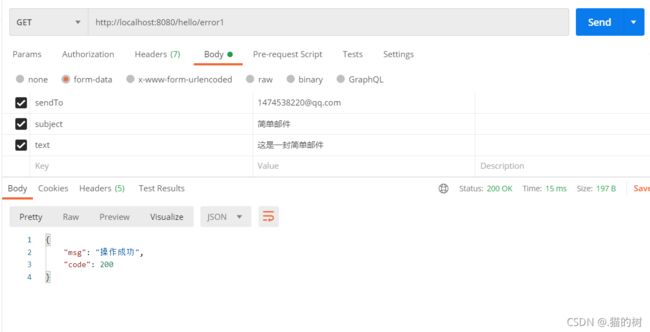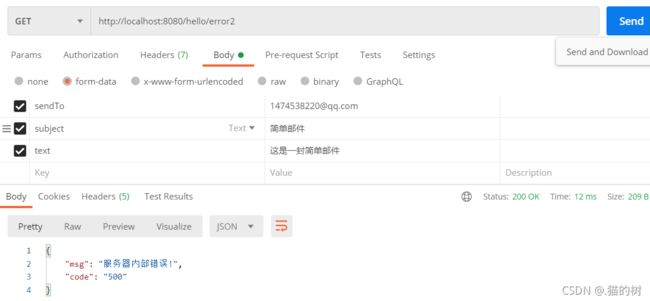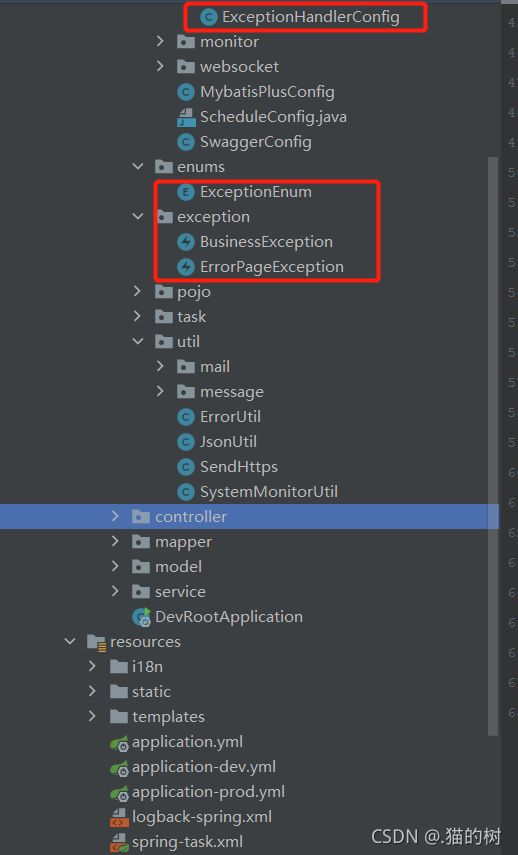SpringBoot —— 统一异常处理
前言
在 Controller 里提供接口,通常需要捕捉异常,进行异常处理。最简单的方法使用try/catch进行异常捕捉。
当方法很多,每个都需要 try catch,代码会显得臃肿,写起来也比较麻烦。
这时就需要进行统一的异常处理。
1.使用方法
通过 Spring 的 AOP 特性就可以很方便的实现异常的统一处理:使用@ControllerAdvice、@RestControllerAdvice捕获运行时异常。
package com.local.dev.root.devroot.common.enums;
/**
* 异常枚举类
*/
public enum ExceptionEnum {
// 400
BAD_REQUEST("400", "请求数据格式不正确!"),
UNAUTHORIZED("401", "登录凭证过期!"),
FORBIDDEN("403", "没有访问权限!"),
NOT_FOUND("404", "请求的资源找不到!"),
// 500
INTERNAL_SERVER_ERROR("500", "服务器内部错误!"),
SERVICE_UNAVAILABLE("503", "服务器正忙,请稍后再试!"),
// 未知异常
UNKNOWN("10000", "未知异常!"),
// 自定义
IS_NOT_NULL("10001","%s不能为空");
/**
* 错误码
*/
private String code;
/**
* 错误描述
*/
private String msg;
ExceptionEnum(String code, String msg) {
this.code = code;
this.msg = msg;
}
public String getCode() {
return code;
}
public String getMsg() {
return msg;
}
}
自定义异常类
package com.local.dev.root.devroot.common.exception;
import com.local.dev.root.devroot.common.enums.ExceptionEnum;
/**
* 自定义业务异常类
*/
public class BusinessException extends RuntimeException {
private ExceptionEnum exceptionEnum;
private String code;
private String errorMsg;
public BusinessException() {
super();
}
public BusinessException(ExceptionEnum exceptionEnum) {
super("{code:" + exceptionEnum.getCode() + ",errorMsg:" + exceptionEnum.getMsg() + "}");
this.exceptionEnum = exceptionEnum;
this.code = exceptionEnum.getCode();
this.errorMsg = exceptionEnum.getMsg();
}
public BusinessException(String code, String errorMsg) {
super("{code:" + code + ",errorMsg:" + errorMsg + "}");
this.code = code;
this.errorMsg = errorMsg;
}
public BusinessException(String code, String errorMsg, Object... args) {
super("{code:" + code + ",errorMsg:" + String.format(errorMsg, args) + "}");
this.code = code;
this.errorMsg = String.format(errorMsg, args);
}
public ExceptionEnum getExceptionEnum() {
return exceptionEnum;
}
public String getErrorMsg() {
return errorMsg;
}
public void setErrorMsg(String errorMsg) {
this.errorMsg = errorMsg;
}
public String getCode() {
return code;
}
public void setCode(String code) {
this.code = code;
}
}
ExceptionHandlerConfig.java
@RestControllerAdvice,统一异常处理
package com.local.dev.root.devroot.common.config.exception;
import com.local.dev.root.devroot.common.enums.ExceptionEnum;
import com.local.dev.root.devroot.common.exception.BusinessException;
import com.local.dev.root.devroot.common.exception.ErrorPageException;
import com.local.dev.root.devroot.common.pojo.ApiResponse;
import com.local.dev.root.devroot.common.util.ErrorUtil;
import lombok.extern.slf4j.Slf4j;
import org.springframework.http.HttpStatus;
import org.springframework.web.bind.annotation.ExceptionHandler;
import org.springframework.web.bind.annotation.ResponseBody;
import org.springframework.web.bind.annotation.ResponseStatus;
import org.springframework.web.bind.annotation.RestControllerAdvice;
/**
* RestControllerAdvice,统一异常处理
*/
@Slf4j
@RestControllerAdvice
public class ExceptionHandlerConfig {
/**
* 业务异常处理
*
* @param e 业务异常
* @return
*/
@ExceptionHandler(value = BusinessException.class)
@ResponseBody
public ApiResponse exceptionHandler(BusinessException e) {
log.error(ErrorUtil.errorInfoToString(e));
return ApiResponse.error(e.getCode(), e.getErrorMsg());
}
/**
* 未知异常处理
*/
@ExceptionHandler(value = Exception.class)
@ResponseBody
public ApiResponse exceptionHandler(Exception e) {
// 把错误信息输入到日志中
log.error(ErrorUtil.errorInfoToString(e));
return ApiResponse.error(ExceptionEnum.UNKNOWN.getCode(),
ExceptionEnum.UNKNOWN.getMsg());
}
/**
* 错误页面异常
*/
@ExceptionHandler(value = ErrorPageException.class)
@ResponseBody
public ApiResponse exceptionHandler(ErrorPageException e) {
log.error(ErrorUtil.errorInfoToString(e));
return ApiResponse.error(e.getCode(), e.getErrorMsg());
}
/**
* 空指针异常
*/
@ExceptionHandler(value = NullPointerException.class)
@ResponseBody
public ApiResponse exceptionHandler(NullPointerException e) {
log.error(ErrorUtil.errorInfoToString(e));
return ApiResponse.error(ExceptionEnum.INTERNAL_SERVER_ERROR.getCode(),
ExceptionEnum.INTERNAL_SERVER_ERROR.getMsg());
}
}
测试类
package com.local.dev.root.devroot.controller;
import com.local.dev.root.devroot.common.pojo.ApiResponse;
import com.local.dev.root.devroot.service.dev.TestServiceImpl;
import org.springframework.beans.factory.annotation.Autowired;
import org.springframework.web.bind.annotation.RequestMapping;
import org.springframework.web.bind.annotation.RestController;
@RestController
@RequestMapping("/hello")
public class HelloWorld {
@Autowired
private TestServiceImpl testServiceImpl;
@RequestMapping("world")
public String HelloWorld() {
return "Hello World!";
}
@RequestMapping("error1")
public ApiResponse Error1() {
return ApiResponse.ok();
}
@RequestMapping("error2")
public ApiResponse Error2() {
String msg = null;
msg.equals("xx");
return ApiResponse.ok("访问成功");
}
@RequestMapping("error3")
public ApiResponse Error3() {
testServiceImpl.getBusinessException();
return ApiResponse.ok("访问成功");
}
}
testServiceImpl 抛出自定义异常
package com.local.dev.root.devroot.service.dev;
import com.local.dev.root.devroot.common.enums.ExceptionEnum;
import com.local.dev.root.devroot.common.exception.BusinessException;
import org.springframework.stereotype.Service;
@Service
public class TestServiceImpl {
public Object getBusinessException() {
throw new BusinessException(ExceptionEnum.IS_NOT_NULL.getCode(),
ExceptionEnum.IS_NOT_NULL.getMsg(), "参数");
}
}
2.测试
正常
http://localhost:8080/hello/error1

空指针异常
http://localhost:8080/hello/error2

业务异常
http://localhost:8080/hello/error3

3.查看日志
« 上一章:SpringBoot —— 多线程定时任务的实现(注解配置、task:annotation-driven配置)
» 下一章:SpringBoot —— 简单整合Redis实例及StringRedisTemplate与RedisTemplate对比和选择


